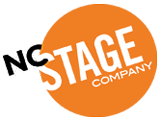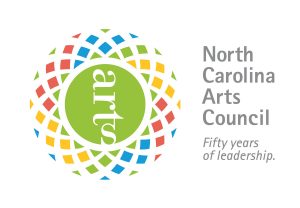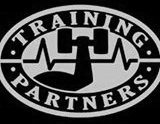At the end of every performance, actor Mike Wiley moves one chair from his minimalistic set to face the audience. In this moment, he begins his nightly post-show talkback, hoping to further engage audiences beyond the script he brings to life. Here we continue that conversation in an exclusive interview recorded from Wiley’s dressing room amidst the buzz of a busy day at North Carolina Stage Company. Listen as Wiley gives us the scoop on his pre-show routines, theatrical challenges, and audience impact. Prefer to read? See the transcript below.
Click below to get your tickets to The Fire of Freedom, now playing through October 6th.
TB: How do you prepare for your shows or how do you get into character?
MW: I try and listen to music that I think that either the main character or thematically the play centers around. Oddly enough, with this particular play, I’ve been listening to a 90s Afro-centric hip-hop group called XClan that I loved in the 90s and really fuels me for this show and I love it. I listen to that, I of course do vocal and breathing exercises, but I also try and center myself in who the character of Abraham Galloway is for this particular show. For other shows, like Dar He or One Noble Journey about Henry Box Brown, the slave who mailed himself to freedom, I try and do the same thing – finding music or something to read that puts me in the proper mindset, medicinally, to walk into the world of the play without feeling tethered to the realities of what is going on in my day, while at the same time there’s no mysticism to it that I’ve got to use the emotions that have been with me throughout the day in whatever happens onstage. A lot of people say when acting, you have to leave all of that stuff behind you, you have to leave it all back in the dressing room, you have to leave it at home and come on stage brand new – you’re trying to create a mystical magic that’s really not possible. The best thing to do is to use whatever it is that you have encountered throughout the day in the work and let however that filters through you that brings a reality to the moment.
TB: You have quite a variety of productions and a variety of characters that you play. Are some productions and characters more challenging than others? How do you cope with that challenge?
MW: I would say yes, all these years of doing Dar He: The Story of Emmett Till, it’s still not easy to play the kind of murderous racist that I have to play in that show, the guys who killed Emmett Till and then after killing him doubled down on the fact that they killed him by saying that they would kill him again given the opportunity – these are things that I have to say on stage, but in the interest of speaking the truth, of being a true character and not a caricature – not being false when I’m playing those people. I have to go there, I have to prepare myself to go there, because ultimately what I’m trying to put forth is an honest portrayal of an individual and it’s tough playing those guys but at the same time if I don’t play those guys with the utmost truth then those folks in the audience that could potentially see themselves or see their relatives in those characters won’t see them – they’ll just see a caricature and say “oh I don’t know that person.” And what I ultimately want is an audience to be affected; changed in some way walk out of the door in a different place than they walked in and if they see my show and see either themselves or see someone they might know, they might walk out with the courage to change themselves or change others.
TB: What do you hope audiences walk away with after The Fire of Freedom?
MW: On the surface I want people to – and I think Howard Craft who wrote it would love for people to know more and want to learn more about Abraham Galloway and who he was and what he did for Americans. Not just African Americans, not just former slaves, but what he did for Americans. And I think that’s the overarching desire of presenting this piece but at the same time you go into the world of the piece and you really want to fire people up. And I don’t mean that in a pun kind of way – I really want people to be excited and want to make some kind of exceptional difference in what is happening in the world of 2019. They see what is happening here in 1864 and hopefully they see the similarities or see some similarities or see some need or necessity to walk out into the daylight of 2019 and say, “holy moly – it’s 2019 and people are still erecting that rebel flag, people are still worshiping a false narrative of ‘heritage not hate.’” Walk out there and do something about it. At the end of the play when I say “We make our demands for the black soldier that has yet to fire a rifle. We make our demands for the black soldier that is already battle weary. We make our demands for those who have already given their lives in pursuit of liberty.” Those are also the demands that we should make of ourselves. They are the demands that we should make of the world that we live in because there are folks out here that are already battle weary because we have been working so hard in the trenches and in these movements, so please join us. Join our fight. Don’t sit on the sidelines and say “I feel for those folks, that’s gotta be terrible to have to look at that flag and blah blah” – well, do something about it, you know.
TB: Do you have anything else that you would like to say to the folks who are listening?
MW: I’m just really happy and proud of NC Stage Company for wanting to not only have me in this space for three weeks or three weekends this time, but having this story. And then last year having the story of Emmett Till, really putting forth a message to your audience that this is what’s important to you all – this is part of your mission statement, that you are going to make a concerted effort to tell the stories of the marginalized. To tell the stories of people who have been “othered” in this country as well as other places, so thank you for that.

















